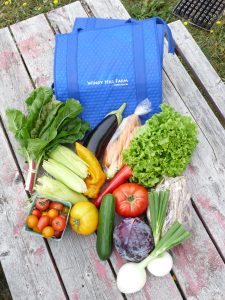Organic Certification:
I believe in sustainable food production and am certified organic mainly for marketing purposes rather than as a statement of values. The rules governing organic certification do not meet all my standards for food production, though they are a good starting point. My livestock will always have more space both indoors and outside on pasture, as well as more access to the outdoors than required by organic standards. As well, I believe it is more sustainable to buy locally produced hay that is grown without the use of chemicals, than to drive a 3 hour round trip to pick up certified organic hay for the animals. Therefore, while the fruits and vegetables are certified organic, the goats and chickens are not at this time.
The Broader Community
Supporting sustainable food production means that I buy all my imported groceries: sugar, bananas and chocolate from fair trade/organic suppliers. I produce most of my own food and support other organic farmers and sustainable fishers to supply what I don’t grow myself. Community involvement is also very important and I am active in networks and cooperative marketing systems with other organic producers in this area.
Marketing direct to consumers through a CSA and selling at farmer’s markets are my preferred selling methods because I get to know my customers. The relationships I have with my customers are one of the things I enjoy most about farming.
Sustainability:
I believe in closing the loop in food production as much as possible: nothing is wasted on the farm as animal manure feeds the soil that supports vegetables and fruit production. Livestock grazing rotations also help nourish the soil and unsold vegetables will supplement the diets of goats and chickens. I collect some of my own vegetable seed, grow herbs for treating parasites in goats, plant flowers to attract beneficial insects and maintain uncultivated spaces on the farm for wildlife and birds.
I maintain a small farm operation and, rather than planning to grow large, prefer to help train others who want to farm so they can supply the growing demand for sustainably grown food.
Education and the Future of Farming
Canada’s farm population is rapidly aging and it is very important to support anyone interested in farming to learn the skills to grow crops, raise livestock and run a business. In the past I’ve worked with apprentices to teach farming and farm management skills through ACORN’s Grow a Farmer program (www.growafarmer.ca) and the federal StepUp program. I’ve also had the pleasure of mentoring new farmers who are starting out on their own properties, offering advice on growing and marketing as needed. As I accumulate years on this planet I realize how important a local food system is. I don’t want to eventually retire and sell the farm but would rather hand over the business to a team of keen new farmers, to continue doing what I started 15 years ago. I am not ready to hand over the reins yet but am interested in meeting people who have a long term plan to run a farm business. If you are interested in starting this conversation, please get in touch with me! There are many exciting cooperative farming models out there that I am keen to explore.

